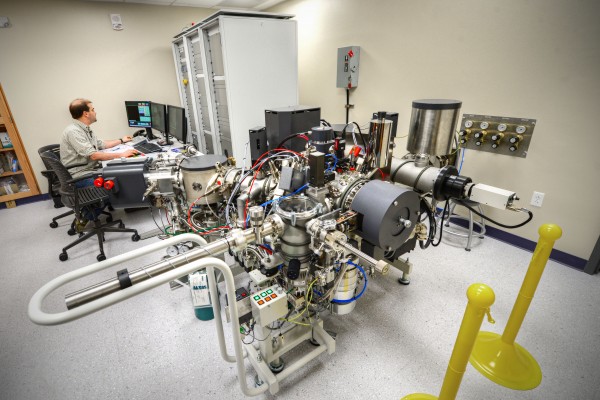$2.4 million instrument upgrade will let scientists see what is happening inside microbes
The U.S. Department of Energy has awarded David Fike, PhD, associate professor of earth and planetary sciences, $2.4 million to adapt a powerful chemical microscope called the 7F-GEO SIMS for biological samples. The updated instrument’s ability to map the chemistry inside cells will boost research on microbes that are promising candidates for biofuel or bioenergy production.
Major Indo-U.S. Advanced Bioenergy Consortium launches
The government of India’s Department of Biotechnology,
Indian corporate leaders and Washington University in St. Louis have
invested $2.5 million to launch the Indo-U.S. Advanced Bioenergy
Consortium for Second Generation Biofuels (IUABC). The goal of the center is to increase biomass yield in
plants and algae, enabling downstream commercial development for
cost-effective, efficient and environmentally sustainable production of
advanced biofuels.
Symposium on America’s Energy Future Nov. 2
America has the potential to solve its energy crisis over the next decade, but doing so will require immediate investment in clean energy technologies, says Mark S. Wrighton, chancellor of Washington University in St. Louis and vice chair of a National Resource Council report on America’s energy challenges. The report will be the topic of a symposium to be held from 12:30 to 5:30 p.m. Monday, Nov. 2, in the May Auditorium in Simon Hall on the Danforth Campus of Washington University in St. Louis.
DOE makes largest research award in Danforth Campus history
Washington University and the Donald Danforth Plant Science Center have received two awards totaling $35 million from the U.S. Department of Energy (DOE) to do research on novel energy initiatives. At $20 million, the Washington University research award is the largest ever received on the Danforth Campus. The $15 million for the Donald Danforth Plant Science Center is the largest the organization has ever received.
Biofuel costs, benefits are focus of public forum, Nov. 14
The profitability of corn ethanol processing, the costs and benefits of ethanol as a fuel source, the impact of the ethanol boom on rural America and the future of the biofuel industry will be among topics explored at a free public forum on the economics of ethanol to be held on campus from 8:30 a.m. to 4:30 p.m. Nov. 14.
Set energy goals and reach them
Wind power is one practical alternative to petroleum.The director of a sustainable energy research center at Washington University in St. Louis is challenging President-elect Barack Obama to set goals in energy research and implementation. “I would like to see the next president of the United States set a similar goal to President Kennedy’s from 1961 — to put a man on the moon and to bring him back to Earth by the end of the decade,” says Himadri B. Pakrasi, Ph.D., the George William and Irene Koechig Freiberg Professor of Biology in Arts & Sciences, and Professor of Energy in the School of Engineering and Applied Science.
Set goals and reach them
Wind power is one practical alternative to petroleum.The director of a sustainable energy research center at Washington University in St. Louis is challenging the next president of the United States to set goals in energy research and implementation. “I would like to see the next president of the United States set a similar goal to President Kennedy’s from 1961 — to put a man on the moon and to bring him back to Earth by the end of the decade,” says Himadri B. Pakrasi, Ph.D., the George William and Irene Koechig Freiberg Professor of Biology in Arts & Sciences, and Professor of Energy in the School of Engineering and Applied Science.
NIH grants enable energy studies
David Kilper/WUSTL Photo(Left to right) Cindy Richard-Fogal, Ph.D., research scientist in biology in Arts & Sciences, Elaine Frawley, graduate research assistant, and Robert Kranz, Ph.D., professor of biology in Arts & Sciences, examine an *E. coli* culture.Robert G. Kranz, Ph.D., professor of biology in Arts & Sciences at Washington University in St. Louis, has been awarded two grants from the National Institutes of Health (NIH) to study pathways in bioenergy conversion. The first, for $1,203,250, is a long-term NIH R01 renewal that began Aug. 1 titled “Cytochrome c Biogenesis.” The renewal award means that NIH has funded Kranz continuously for 22 years.
Washington University in St. Louis to invest $55 million in renewable energy research initiative
Washington University in St. Louis is creating a new International Center for Advanced Renewable Energy and Sustainability (I-CARES) to encourage and coordinate university-wide and external collaborative research in the areas of renewable energy and sustainability — including biofuels, CO2 mitigation and coal-related issues. The university will invest more than $55 million in the initiative, according to Chancellor Mark S. Wrighton.
Biologist finds cell wall construction pathway
Photo courtesy USDAA WUSTL biologist has advanced the understanding of plant cell walls, which are crucial to plants such as cotton, which needs the cell wall to impart elasticity in cotton fibers.Wood with altered properties and cheaper ethanol through more efficient production are two possibilities as a result of a find by a biologist at Washington University in St. Louis. Erik Nielsen, Ph.D., Washington University biologist , has made a discovery published in a recent edition of The Journal of Cell Biology that sheds new light on how some types of complex sugars in plants are directed to the construction of cell walls. More…
View More Stories

